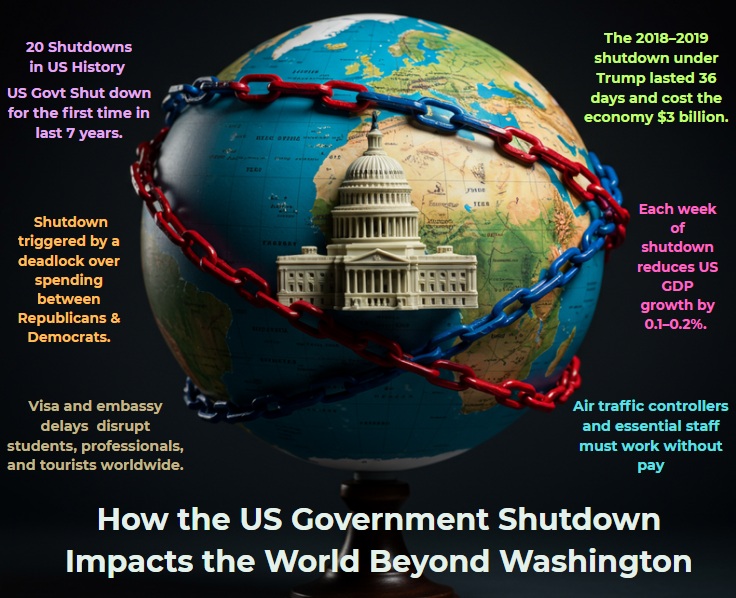The United States government has shut down for the first time in nearly seven years, after Republicans and Democrats failed to reach a budget deal before the new financial year began. While the immediate consequences are visible in Washington—unpaid federal workers, stalled services, and political blame games—the ripple effects extend far beyond US borders.
This article explores the global impact of the US government shutdown—from trade and travel delays to economic risks and geopolitical consequences.
What Triggered the US Government Shutdown?
👉 Political Deadlock: Republicans and Democrats failed to agree on federal spending.
👉 Senate Gridlock: Republicans alone lack the 60 Senate votes needed to pass a budget.
👉 Blame Game: Republicans hope voters blame Democrats, while Democrats frame their stance as a fight for affordable healthcare.
Global Economic Impact of the US Shutdown
1. Financial Markets and Investor Confidence
The US is the world’s largest economy and home to the dollar and US Treasuries, the backbone of international finance. Shutdowns erode investor confidence and cause:
👉 Volatility in global stock markets.
👉 Strengthening of safe-haven assets like gold and the Japanese yen.
👉 Potential weakening of the dollar if shutdowns last long.
Each week of shutdown reduces US GDP growth by 0.1–0.2%. That slowdown can spill over to trading partners like China, Germany, Japan, and South Korea.
2. Trade and Supply Chain Disruptions
👉 Customs Delays: Reduced staffing at ports and borders slows the clearance of goods.
👉 Export Licenses: Delays in US approvals affect international defense and tech industries.
👉 Global Supply Chains: Export-driven economies may face production delays, hitting manufacturing hubs across Asia and Europe.
Travel, Immigration, and Visa Backlogs ✈️
👉 Visa Services: US embassies and consulates operate at reduced capacity, leading to delays for students, professionals, and tourists.
👉 Tourism: A slowdown in visa issuance can hurt international tourism, especially from high-demand countries like India, China, and Mexico.
👉 Air Travel Risks: Air traffic controllers must work unpaid, increasing stress and potential risks for international flights.
Geopolitical and Diplomatic Fallout 🌐
👉 US Credibility at Risk: Frequent shutdowns feed into global perceptions of American decline and unreliability.
👉 Humanitarian Aid & Development: USAID and State Department programs are disrupted, weakening US soft power and creating opportunities for China and Russia to expand influence.
👉 Allied Concerns: Security partners may question Washington’s ability to remain a stable leader when domestic governance is in disarray.
Technology, Science, and Innovation
👉 NASA & Research Agencies: Shutdowns halt international projects in space exploration, climate research, and scientific collaboration.
👉 Regulatory Delays: Global pharma and tech firms awaiting FDA or regulatory approvals face costly delays.
President Trump’s Response
President Trump blamed Democrats for the shutdown, while also suggesting it was an “opportunity” to cut welfare programs and reduce “fraud, waste, and abuse.” Whether this was a negotiating tactic or a genuine policy stance, such rhetoric adds uncertainty to global perceptions of US governance.
Historical Context: A Recurring Pattern
👉 20 Shutdowns in US History: Government shutdowns are not rare, but their frequency has grown in the past two decades.
👉 The Longest Shutdown: The 2018–2019 shutdown under Trump lasted 36 days and cost the economy $3 billion.
👉 Global Perception: Each shutdown reinforces doubts about Washington’s ability to manage fiscal and political stability.
Why the World Should Worry 🌍
👉 Economic Slowdown: A prolonged US shutdown affects global trade, finance, and GDP growth.
👉 Political Reliability: Allies question US stability, while rivals use shutdowns as propaganda.
👉 Dollar Dependence: Repeated crises may accelerate global moves to reduce reliance on the dollar and US-led institutions.
Final Takeaway
The US government shutdown is more than a domestic political squabble—it’s a global risk event. A week-long shutdown may cause inconvenience, but a month-long deadlock could shake international markets and strain supply chains. If shutdowns become routine, they could erode trust in the United States as the world’s economic and political anchor, reshaping the global order.
#USGovtShutdown, #USShutdown, #DonaldTrump, #Trump, #Democrats, #Republicans, #WorldNews, #BreakingNews, #GlobalEconomy, #USEmbassy, #Layoffs, #TrendingNow, #dailydozes,
Discover more from DailyDozes NEWSPAPER
Subscribe to get the latest posts sent to your email.
